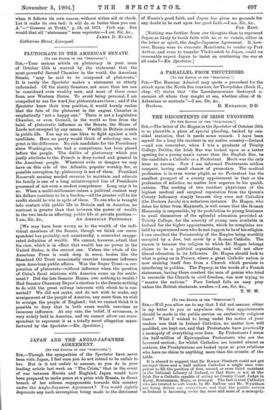SIR,—Your serious article on plutocracy in your issue of October
15th is marred by the statement that the most powerful Second Chamber in the world, the American Senate, "may be said to be composed of plutocrats." It is rarely the Spectator makes a statement so utterly unfounded. Of the ninety Senators, not more than ten can be considered even wealthy men, and most of these come from new Western States. To avoid being personal, I am compelled to use the word few plutocrats are there ; and if the Spectator knew their true position, it would keenly realise that the fate of the plutocrat in the august Chamber is emphatically "not a happy one." There is not a Legislative Chamber, or even Council, in the world so free from the taint of plutocratic influence as the Senate, the House of Lords not excepted by any means. Wealth in Britain counts in public life. You say no one likes to fight against a rich candidate. Here no party would think of selecting one, so great is the difference. No rich candidate for the Presidency since Washington, who had a competence, has been placed before the people. The dislike of plutocracy which you justly attribute to the French is deep-rooted and general in the American people. Whatever evils or dangers we may have on this side of the Atlantic, popular worship for, or possible corruption by, plutocracy is not of them. President Roosevelt earning needed revenue to maintain and educate his family is one of a long uninterrupted line of Presidents possessed of not even a modest competence. Long may it be so. When a multi-millionaire enters a political contest may his dollars continue to be a burden,—all the greater will be his credit should he win in spite of them. To one who is brought into contact with public life in Britain and in America, no contrast is greater than that between the power of wealth in the two lands as affecting public life or private position.— I am, Sir, &c., AN AMERICAN PLUTOCRAT.
[We may have been wrong as to the wealth of the indi- vidual members of the Senate, though we think our corre- spondent has probably, not unnaturally, a somewhat exagge- rated definition of wealth. We cannot, however, admit that his view, which is in effect that wealth has no power in the United States, is the correct one. Unless the whole of the American Press is sunk deep in error, bodies like the Standard Oil Trust occasionally exercise immense influence upon American public affairs. Was the Sugar Trust—a cor- poration of plutocrats—without influence when the question of Cuba's fiscal relations with America came up for settle- ment ? Did the late Senator Hanna owe nothing to wealth ? Had Senator Chauncey Depew's election to the Senate nothing to do with the great railway interests with which he is con- nected ? We did not make, and do not wish to make, any arraignment of the people of America, any more than we wish to arraign the people of England ; but we cannot think it is possible to deny that in both cases wealth exercises an immense influence. At any rate, the belief, if erroneous, is very widely held in America, and we cannot allow our corre- spondent to represent it as a totally novel allegation manu- factured by the Spectator.—En. Spectator.]


























































 Previous page
Previous page